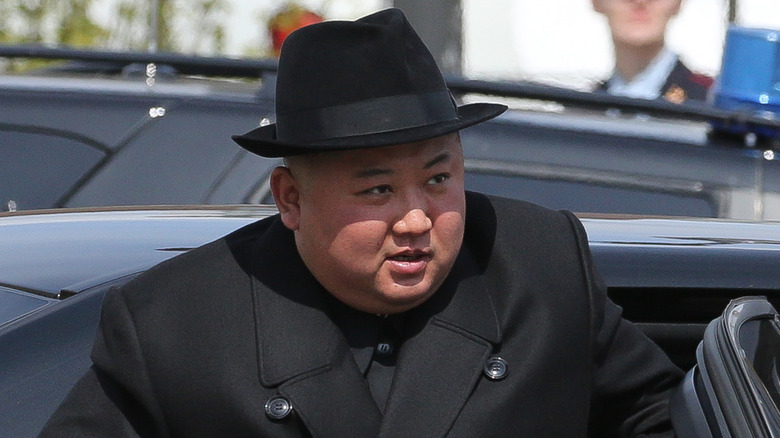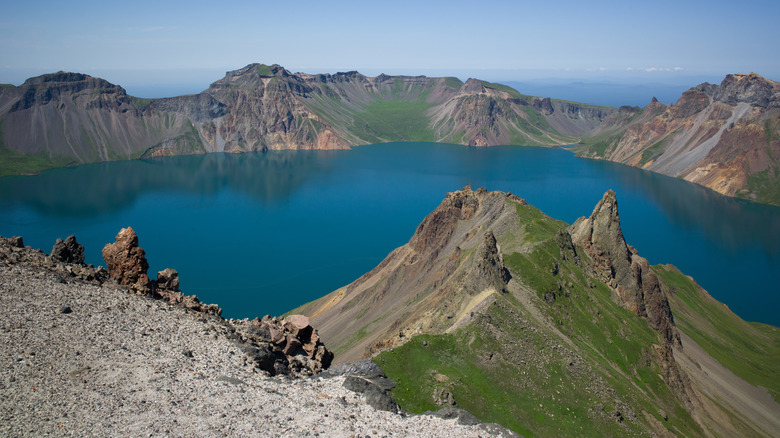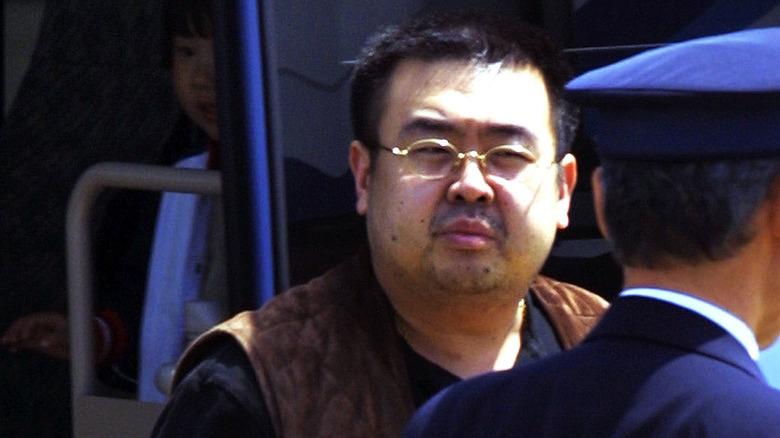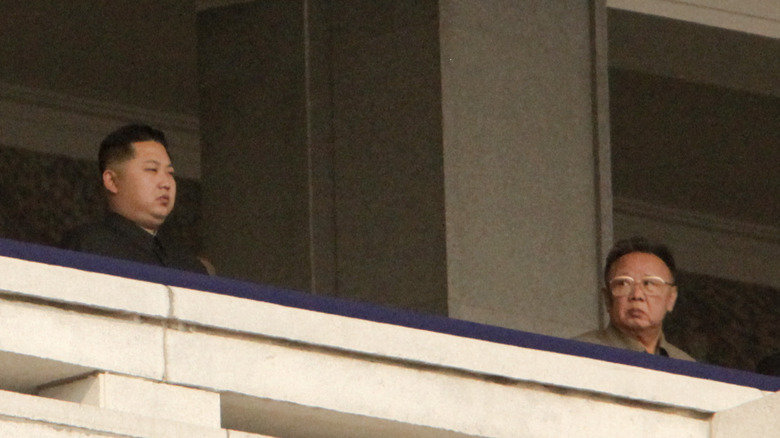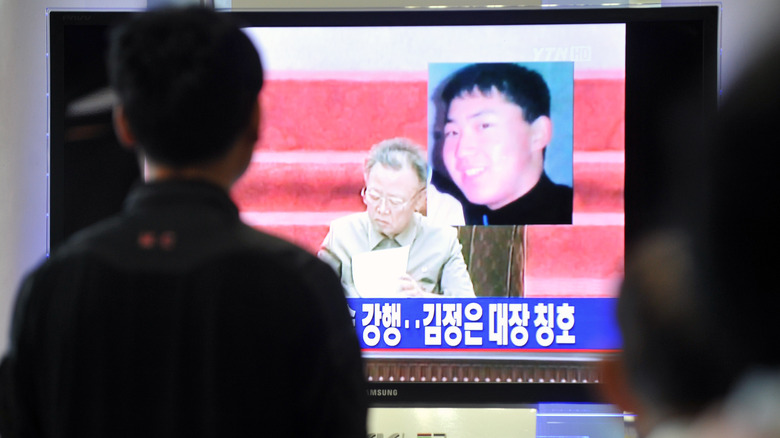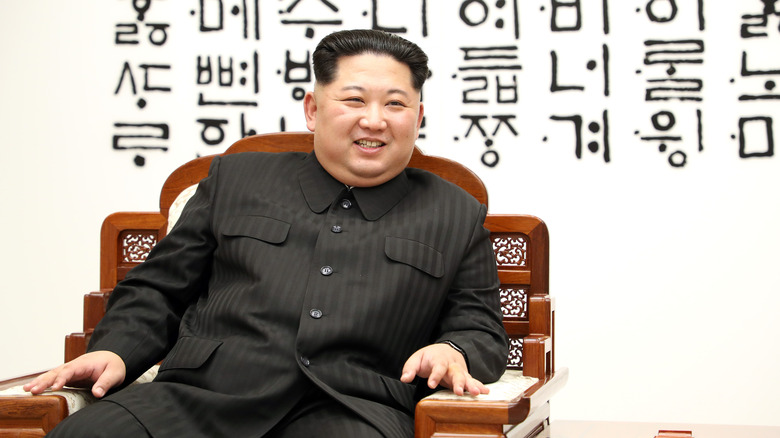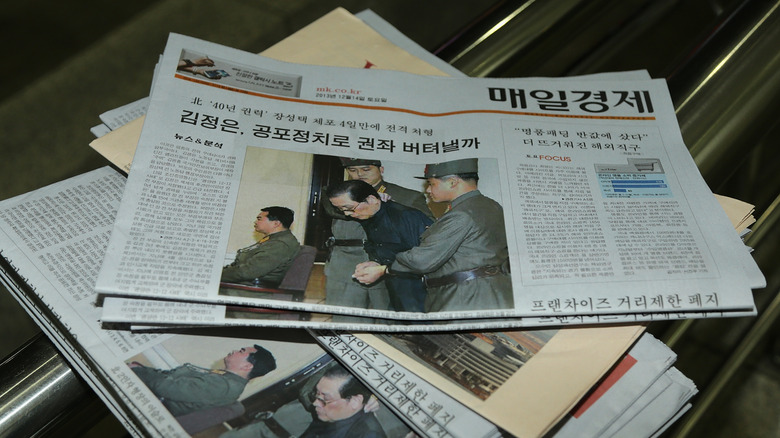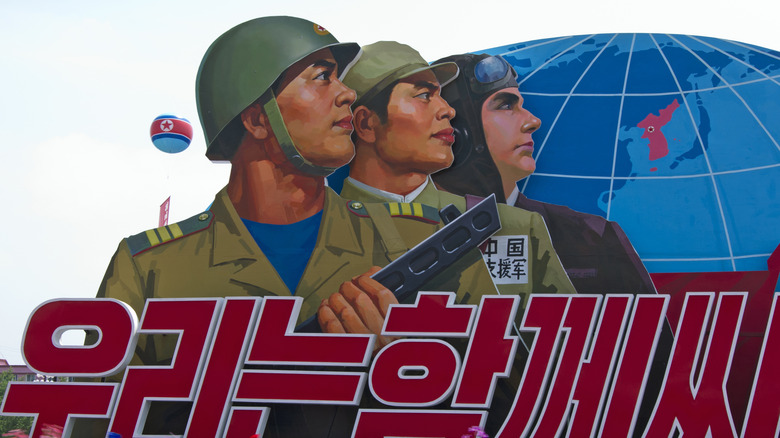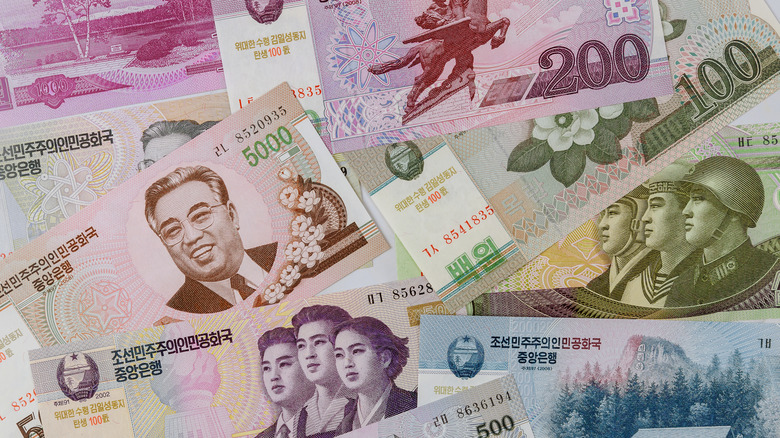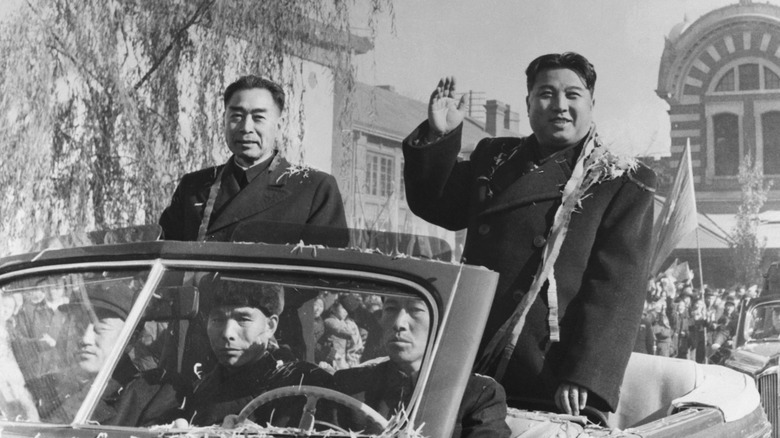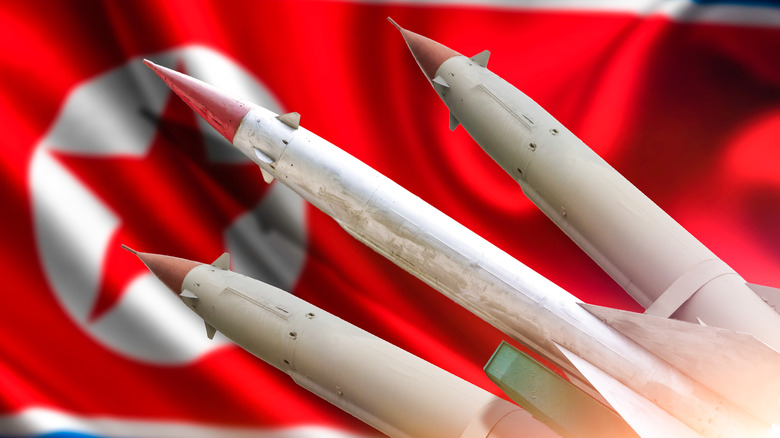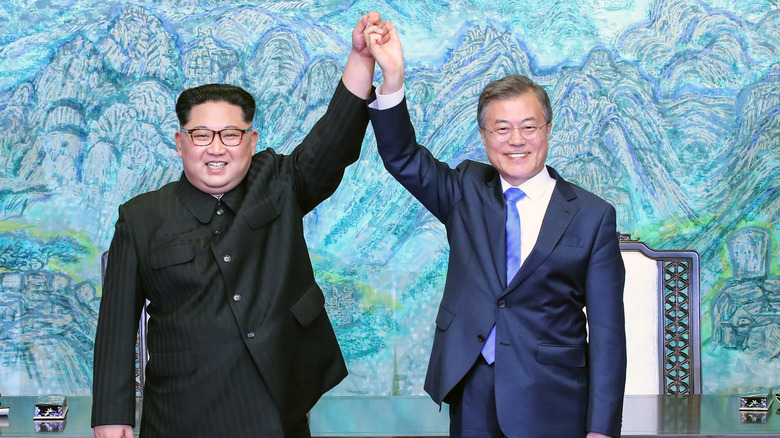The Rise Of North Korea's Kim Jong Un
In late 2011, things were set to dramatically change in North Korea. The infamously closed-off nation, officially known as the Democratic People's Republic of Korea (DPRK), was ostentatiously mourning the death of its previous leader, Kim Jong Il, who died in December. By the close of the year, his son, the reportedly 27-year-old Kim Jong Un, had taken the reins of power. Though state media claimed that the younger Kim had been in control since October, much remained to be seen about his hold on power in the years to come. Few outside of the regime knew who he was, to the point where even today no one is entirely sure of his birth year.
At the time, many speculated that Kim Jong Un could bring a new sense of openness to his country. Or perhaps, given his lack of political experience, he would simply crash and burn. Neither happened. To outsiders, the DPRK remains largely inaccessible, while North Koreans themselves have little freedom to leave the country. Given Kim's bellicose rhetoric pumping up his nation's nuclear weapons program, neither has his regime grown any friendlier than the last.
But how did Kim Jong Un get here? Even though good intel is hard to come by when talking about North Korea, almost everyone agrees that its power struggles can be cutthroat. Even a seriously privileged member of the elite like Kim can't rest on his laurels. Here's how he ascended to power and what he's done to keep it for over a decade.
Kim Jong Un comes from a near-mythical family
The story of how Kim Jong Un got to his current state begins well before his birth. Ask a faithful North Korean — or at least one who's cautious enough to toe the party line when asked — and you'll learn that the current leader is descended from a family line that's not only perfect but destined to lead North Korea to glory. It centers on the volcanic Mount Paektu (pictured), which sits on the northern border with China and where the progenitor of all Koreans is said to have appeared more than 4,000 years ago.
Kim Il Sung hitched his family's wagon to Mount Paektu by claiming to fight the Japanese via a guerilla campaign based on the mountain and, later, routing American invaders to the south (which, as many people outside of the DPRK will point out, definitely did not happen). Myth also has it that his son and successor, Kim Jong Il, was born in 1942 at the foot of the mountain underneath a double rainbow and a bright star, an occasion now celebrated as the Day of the Shining Star. However, more objective sources indicate that the younger Kim was actually born in the Soviet Union in 1941, where his father had retreated during his campaign against Japanese invaders.
Since then, the Kims have presented themselves as scions of the Mount Paektu bloodline, who go about besting enemies in wrestling matches, becoming fluent in seven languages, making important scientific discoveries, and riding white horses into the sunset.
His brothers didn't pass muster
Though North Korea may present itself as an egalitarian communist state, in reality, it is a highly patriarchal society in which women rarely gain political power and a male-preferential hierarchy is the norm. This, along with the growing cult of personality centered on the Kim family, meant that the sons of Kim Jong Il were first up when it came to finding their father's successor. But who, exactly, was going to take over the steadily growing cult of personality centered on their family wasn't clear.
If the line of succession had been decided along strictly traditional norms, the first-born boy would have been the obvious pick. However, being the eldest son isn't an express ticket to the seat of power, at least not in North Korea. Kim Jong Il's first son, Kim Jong Nam (pictured), wasn't selected. He may have been passed over because he was simply too open to the ways of the outside world and would have destabilized the regime. Kim Jong Chol, the second-born, was reportedly considered to be too feminine and pliable — hardly what was needed in the eyes of a strong, patriarchal leader. But Kim Jong Un, the leader's more aggressive third son, was apparently made out of the right stuff. Kim Jong Un was so obvious a pick as the successor that he may have been singled out for the Great Leader role as early as his 8th and 9th birthday parties.
He began appearing in public before his father's death
Though Kim Jong Il may have picked his son Kim Jong Un as his political successor early on in the boy's life, the younger Kim wouldn't begin making public appearances until a few years later. That was in keeping with precedent, as Kim Jong Il had been selected for the same role in 1980, but didn't actually take the reins of power until Kim Il Sung died in 1994.
Before Kim Jong Il's 2011 death, political machinations had already begun to make it clear that Kim Jong Un was the anointed heir. When the Great Leader made a public appearance, the younger man was often there, too. Kim Jong Un also began to collect a rather impressive slate of titles despite a seeming lack of military or political experience. These included plum spots in the nation's Central Committee and helping run the Central Military Commission. In 2010, he even became the equivalent of a four-star general, though there's no evidence he had done anything in North Korea's armed services beyond attending a military academy.
When the elder Kim died in December 2011 — reportedly because he worked so heroically hard for his people that he was felled by a stress-induced heart attack — his son was primed to take his place. But, likely aged only 27, Kim Jong Un was strikingly young to lead an entire country. His success was hardly guaranteed.
Kim Jong Un was educated in Europe
Though he has spent the majority of his life in North Korea, Kim Jong Un traveled to Switzerland for a four-year stay beginning in 1996. There, he lived with his aunt, uncle, and brother, Kim Jong Chol. The young man went by the name Pak Un, claiming to be the child of North Korean diplomats. His aunt, Ko Yong Suk, told reporter Anna Fifield (via Politico) that they lived a relatively low-key life, though one with plenty of money for ski trips and jaunts to the French Riviera and Disneyland Paris. However, those displays of wealth likely didn't stand out among other diplomats' children at the private school Kim Jong Un first attended just outside of Bern.
By 1998, however, things had taken a drastic turn. His mother, Ko Yong Hui, was diagnosed with breast cancer and began treatment in nearby France. With their family link to the regime failing, Kim's aunt, uncle, and their three children defected to the United States. After a summer in his homeland, Kim Jong Un returned to Switzerland to attend a public school where new students wouldn't ask troublesome questions about his missing family.
At this new school, Kim Jong Un struggled to understand lessons taught in German, reportedly becoming aggressive when his classmates would speak in the language (though his language skills and attitude reportedly improved as time went on). Kim abruptly left this school and the rest of Europe behind in the spring of 2001, apparently having never told anyone there the truth of his identity.
Many assumed that the new, young leader would fail
At the time of his father's death in 2011, Kim Jong Un was likely 27 years old, at the time making him the youngest head of state in the world. This was a tricky position to be in, for multiple reasons. Kim Jong Il had been presented as his own father's successor for many years, giving him an opportunity to both gain political experience and shore up his image in North Korea. The Kim Jong Un may have also faced skepticism from his own people based on his age, though North Korean society has vacillated between respect for the wisdom of elders and frustration at their supposedly outdated way of doing things.
To get his political bearings, Kim Jong Un may have relied on the political acumen of his father's sister, Kim Kyong Hui, and her husband, the high-ranking official Jang Song Thaek. In patriarchal North Korea, Kim Kyong Hui has been the rare woman to hold real power in the country's political system, becoming a four-star general herself in 2010. Along with Jang, she appeared often with the newly minted leader Kim Jong Un. Choe Ryong Hae, a military officer who is still in power, also popped up in association with Kim Jong Un in those early days.
He hasn't hesitated to execute inconvenient people
Though Kim Jong Un may have gotten help from his family and other associates from his father's regime, that was no guarantee of survival. Even his half-brother, Kim Jong Nam, wasn't out of danger. By the time Kim Jong Un came to power, Kim Jong Nam was living a Westernized lifestyle and had started to issue troubling statements about how things needed to change in his home country. He was the subject of at least two assassination attempts in 2010 and 2012. A third in February 2017 in Kuala Lumpur, Malaysia, succeeded via the use of a deadly nerve agent. Though Kim Jong Un did not admit to ordering the hit, many think it's all but certain that he gave the order.
But even seemingly loyal members of the regime weren't safe. Jang Song Thaek, the uncle who probably helped the new leader consolidate power, was executed for treason in late 2013. While it's unclear if Jang was planning a coup, it is known that he was second in power only to his nephew and was open to reform.
For a while, even Kim Jong Un's aunt, Kim Kyong Hui, appeared to have been a victim of her nephew's purges, according to a CNN report. Soon after her husband Jang Song Thaek's death, she dropped out of the public eye for years. She reappeared in 2020 sitting next to Kim Jong Un and his wife at a public event, making it clear that she was still living, though likely with far less influence than she once enjoyed.
He reconfigured governmental and military hierarchy
Soon after Kim Jong Un became North Korea's head of state, the political and military elite of his country faced serious upheaval. Some, like Kim's uncle Jang Song Thaek, were arrested, charged with treason, and executed in gruesome fashion by anti-aircraft guns. Others faced forced retirement or demotions that pushed them out of the sphere of influence.
Yet, while this may have spelled the beginning of a dangerous period of instability for other rulers, it appears to have been part of Kim Jong Un's plan. For one, elders in the hierarchy who might have been able to leverage their experience to challenge him were out of commission. Anyone left could have found themselves in new positions that likewise sidelined them. Others who, to the outside world, suddenly left public view may have instead been appeased or hushed up with plum positions elsewhere. Certainly, the example made of Jang Song Thaek and his associates would have made any potential rebel think twice. And with so many entrenched figures of the old regime silenced and the established system destabilized, only one figure remained as a powerful constant: Kim Jong Un.
He has allowed small economic changes
North Korea's economy has never been entirely stable. Today, the country is considered one of the poorest in the world. While some hardship is due to sanctions imposed on North Korea, others point to the nation's isolationist policies and the government's iron grip on the its industry, which has likely stifled economic growth.
So, it may have been a relief for some to learn that Kim Jong Un had decided to lend some power back to local economies early on in his reign. Black market activity, which ramped up during food shortages in the late 20th century, is even allowed to operate more or less in the open. Still, these changes haven't led to larger economic shifts and may instead be superficial measures meant to appease both commoners and more powerful elites in North Korean society. These changes are perhaps more likely to keep those moneyed North Koreans happy and their private industries functioning (and supporting the Kim regime) despite sanctions.
Given how North Korea makes and spends its money, Kim and his subordinates may only have a limited amount of space to change the economy. His emphasis on building up the DPRK's military has brought economic sanctions, while COVID-induced border closures further tightened belts to the point where even American currency has made its way into the market to keep things moving. Illegal smuggling and cryptocurrency operations can only do so much to buoy the economy, leaving Kim's economic promises in uncertain territory.
He has mimicked his grandfather's style
In 2013, some outlets published speculation that Kim Jong Un had gone under the knife to look more like his grandfather, the widely beloved (at least in North Korea) Kim Il Sung (pictured). North Korean state media quickly derided the idea as nothing more than scandalous gossip.
While there's no evidence that Kim Jong Un has had his appearance surgically altered to evoke the memory of Kim Il Sung, it is clear that he has drawn on the powerful image of North Korea's founding father. Wouldn't you, if the example was someone who has become a quasi-deity referred to as the nation's Eternal President and whose embalmed remains are still a major draw in the capital?
For evidence, you need only consider Kim Jong Un's fashion sense. He's often spotted in vintage style, namely distinctive Mao suits favored by both his grandfather and communist Chinese leader Mao Zedong, as well as other Chinese notables. The two North Korean leaders also sport similar blunt hairstyles and black-rimmed glasses. While many take this as a clear callback to the good old days of a more prosperous North Korea under the first Kim, not everyone agrees. Author and analyst Michael Madden told The Guardian that the look may also be an attempt to project a more general image of gravitas, paternalism, and power. Either way, Kim Jong Un's look is integral to his perfection of control over the country.
Kim Jong Un built up North Korea's nuclear program
Little else has generated news headlines and raised alarm about the DPRK like the country's nascent nuclear program. Kim Jong Un has often released bombastic statements threatening perceived enemies with nuclear annihilation.
However, Kim hasn't built North Korea's nuclear program from scratch. His country's irradiated dreams have their origins in the era of Kim Il Sung, who, along with the rest of the world, saw the devastating power of nuclear weapons after the United States' 1945 bombings of Hiroshima and Nagasaki in Japan. He may have teamed up with the Soviet Union to lay the groundwork for a nuclear program with relatively stable support. By the 1980s, the DPRK had gained the ability to produce weapons-grade plutonium on its own. The idea then was almost certainly to create weapons that would act as a deterrent and shore up the regime's stability and claim to power.
Though the U.S. didn't seem all that bothered about North Korea's nuclear dreams in the early years, recent events under Kim Jong Un have proven far more eye-catching. He's not only succeeded in establishing in-country nuclear plants capable of creating weapons, but new transportation networks have made it easier to move those weapons around the DPRK. Those weapons have also been the subject of highly publicized tests. Combined with Kim's talk of defending his nation with nuclear missiles or even preemptively striking bothersome rivals with them, North Korea's boosted nuclear program may be his signature achievement.
He has framed himself as a modernizer
Though Kim Jong Un clearly wants to draw on the achievements of his predecessors, recalling the good old days only gets a young dictator so far. To improve one's image with the common folk, please in-country elites, and keep outsiders guessing, things need to move forward. Or at least they need to appear that way. At the beginning of his rule, Kim promised to bring economic progress, though he's had limited success due to economic sanctions, the COVID-19 pandemic, and his own unwillingness to relinquish control. Even major events like meeting with the U.S. and South Korean presidents haven't gone far.
Still, visitors to the capital of Pyongyang report some changes. The richest people there can enjoy some very Western treats, like European-style ski resorts, gyms with yoga classes, "Harry Potter" books, and luxury handbags. Even long-entrenched conservative values seem to have shifted, as younger generations sport more form-fitting clothes. Some North Koreans have even become social media figures, though many observers suspect that their videos are carefully staged to reflect only the most privileged lifestyles rather than what life is like for most people in North Korea. More ordinary citizens of the DPRK are unlikely to have access to a corner coffee shop or even reliable electricity. Given all this, it appears that Kim Jong Un is a modernizer only to the extent it helps him. Anything that genuinely threatens his position, like opening borders or making peace agreements with other countries, doesn't appear to be happening any time soon.
